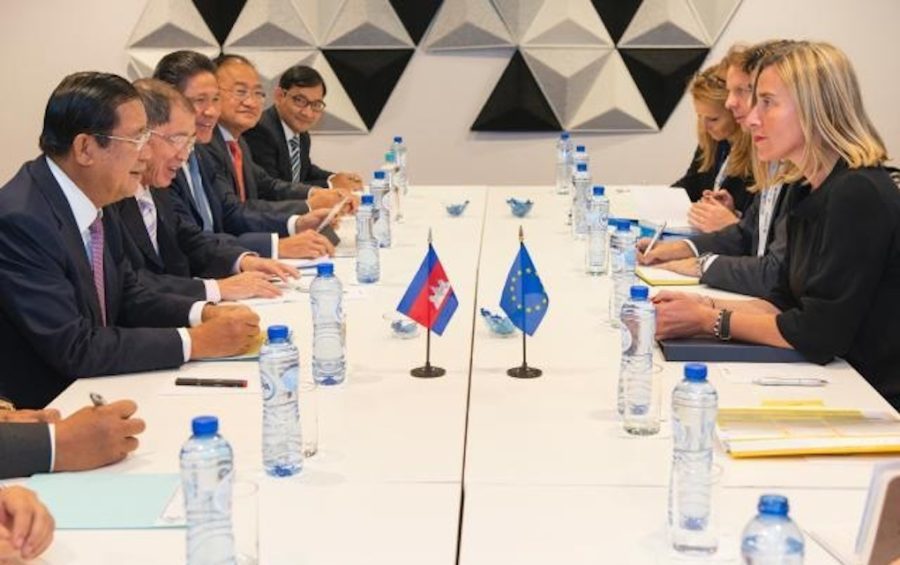The European Union has called on Cambodia to protect labor and human rights associated with land titling, press freedom, political participation, trade union organizing for teachers and informal workers, and other areas of concern, in order to keep its duty-free trade access to the bloc.
Cambodia’s steps to address “serious and systematic” rights violations noted by the European Commission were “insufficient” to change its assessment of the country’s rights compliance under a preferential trade deal with the EU, according to pages of a Commission report seen by VOD.
The Commission concluded that “serious and systematic violations” of the principles of the International Covenant on Civil and Political Rights, as well as violations of international labor conventions, exist in the country, threatening Cambodia’s continued duty-free and quota-free access to the E.U. bloc, which requires compliance to human and labor rights standards.
Cambodia’s detention of the main opposition president Kem Sokha and dissolution of his party, the CNRP, in 2017, among other “repressive actions,” appeared to violate international rights treaties, the report says.
Other government actions cited by the Commission include the continued arrests and detentions of political activists and supporters over the past three years, banning of more than 100 senior opposition members from politics, and removing 5,007 elected opposition commune councilors from their positions.
“These actions have gravely curtailed political rights, political participation and electoral rights in Cambodia,” it says.
Pages of the confidential report were provided to VOD by an official source who requested anonymity.
A European Commission spokesman on Monday declined to comment on the authenticity of the pages published by Radio Free Asia, three of which are identical to those seen by VOD. The Foreign Affairs Ministry last week called RFA’s reporting “false information.”
The spokesman referred VOD to a Commission statement released last week, which said that the aim of the EBA withdrawal procedure was to “address human rights and labour rights concerns in Cambodia.”
“While the European Union remains committed to working with the Cambodian authorities on this aim, real and credible improvement on the issues of concern is needed in order to avoid the withdrawal of EBA preferences,” the Commission said.
The EBA report also highlighted:
- “Sanctions and threats” against teachers trying to organize unions.
- Difficulties faced by domestic workers and other informal workers seeking to create or join unions.
- Problems with forming trade unions at international companies that have been unresolved since 2015.
- Legal actions taken against union leaders, including, it said, a new case against NagaWorld union leader Chhim Sithar.
- Restrictions on press and media activities and the harassment and arrests of journalists.
- The repression of peaceful assembly.
- Shortcomings in land titling, particularly regarding indigenous peoples’ rights.
It noted several areas of improvement, including proposed amendments to the Trade Union Law and “tangible progress” in resolving land disputes, some of which have been made since the review process was started in February.
Cambodia’s Supreme Court dissolved the opposition Cambodia National Rescue Party (CNRP), the only viable political challenger to the ruling party of Prime Minister Hun Sen, in November 2017.
Sokha was arrested and jailed on widely criticized treason charges in September 2017. Sokha denies accusations of attempting to overthrow the government with foreign support.
The Phnom Penh Municipal Court on November 10 eased his court restrictions, however, he still faces the charges, and is not allowed to leave the country or participate in political activities.
Hun Sen has led the nation for 34 years. Following the CNRP’s dissolution, his party won all 125 parliamentary seats in a 2018 election that the government called democratic and some Western nations called neither free nor fair.
Cambodia’s Foreign Affairs Ministry in a statement on Friday accused RFA of providing “false information with the intent to deceive the public about the European Commission’s report.” The ministry also said quotations published by RFA that were “supposedly taken from the said report were not accurate.”
In response, RFA released four pages of the report online, after the outlet reported on the commission’s findings in the report.
“Cambodia’s foreign ministry accused RFA of providing ‘false information’ related to a damning EU preliminary report on the country’s failure to improve its rights record. RFA’s reporting was based on documents obtained from official sources,” the outlet said on Twitter on Saturday.
The Commission delivered its report to Cambodia on November 12. The government has one month to respond. The commission’s decision is due in February.
Additional reporting by Michael Dickison













